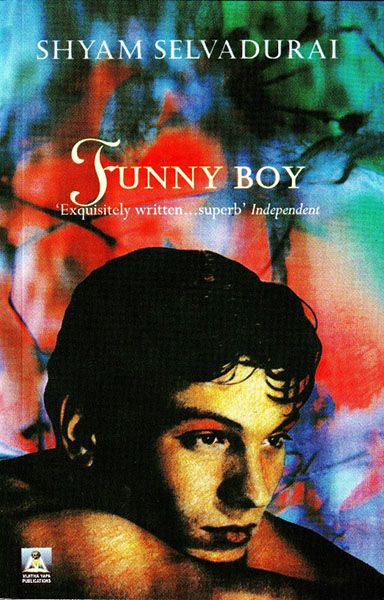I found Shyam Selvadurai engaging, reading from the beginning of Funny Boy and answering naive questions (only one from someone who seemed to have read the book already). He is slender and very dark. He wore a multi-colored long-sleeved shirt, khakis and very solid black shoes. He didn’t want to talk about his next book Cinnamon Gardens, 1998], set in Ceylon in the 1920s. He’s not ready to write about his experience going to Canada as a refugee after the 1983 riots in Colombo that pushed him and his fictional protagonist out. SS is learning Tamil for the book.

Like Arjie, he went to the Sinhalese rather than the Tamil track in school. (His mother is Sinhalese, but his name marks him (and her) as Tamil in the genocidal struggle in Sri Lanka). His mother tongue is English. Like Arjuna he had to accustom himself to not being elite and rich anymore in Canada. A major difference, SS said, was that his family is more liberal than the more typical family in the book. His parents read “funniness” as being artistic (and were ultimately proved right, no?). Rather than trying to butch him up, they sent him to ballet school (in tights across a military camp, where no one hooted at him).
I not only bought but read the book (while I had his voice in my head, especially the drawn-out “But why?”s). It seems less novelistic than a series of stories about an unmasculine Tamil boy growing up in Sri Lanka as ethnic strife worsens and reaches cosmopolitan Colombo. There is development (not least, of Arjie’s awareness of homosexuality and of the coming violence), but the chapters seem pretty self-contained. The major character (other than Arjie) of each pretty much disappears in subsequent chapters (a Dutch/Australian one is killed and Jegan is driven off as a suspected Tamil Tiger). Radha Aunty and Shehan reappear briefly after the riots, but Her Fatness only occurs in the first chapter.
I don’t quite believe that the wistfulness (at each loss) is the child’s, but can suspend disbelief easily. Arjie is two years younger than Selvadurai and the incomprehensions work narratively, however post hoc their imaginings are.

He lives with a(n Anglo?) Canadian lover, not with his family, and is unwilling to generalize about “South Asians in Canada” (especially re homosexuality). In Sri Lanka the first edition sold out quickly and the book’s homosexuality was not much of a focus, except for a few Tamils. His appearance at the British Consulate was mobbed with fans.
©21 April 1996, Stephen O. Murray

